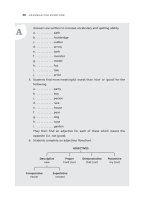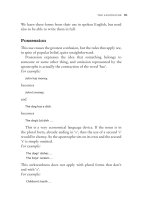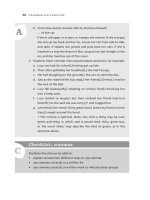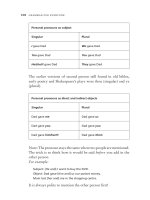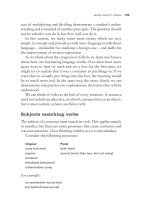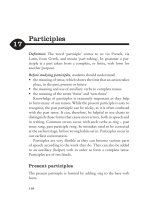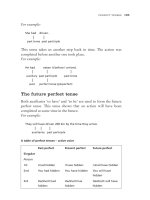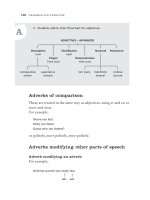Tài liệu Grammar for everyone part 24 docx
Bạn đang xem bản rút gọn của tài liệu. Xem và tải ngay bản đầy đủ của tài liệu tại đây (144.22 KB, 7 trang )
A
Genitive
The genitive case refers to someone, or something, that possesses
something, for example:
This theatre’s acoustics are superb.
Vocative
The vocative case refers to the words by which you address persons
or things, for example:
Hurry, girls, the play is about to start.
24.1 Activities: case
1. Students identify the case of each of the nouns or pronouns in the
following sentences.
a. Dad sings in the shower.
b. Rory sat on a green mat.
c. Driver, please stop at the entrance.
d. Lucy’s sister has asthma.
e. Give the principal this note, Cassie.
2. Students write two sentences for each of the following words, using
a different case for each, for example:
elephant: My uncle has an elephant’s tusk. (genitive)
Elephants are reputed to have long memories.
(nominative)
a. explosion
b. Queen Victoria
c. algebra
d. speaker
e. love
151
c A s e
152
G r A M M A r f o r e V e rY o n e
C
Checklist: case
Students should now be able to:
• define the term ‘case’
• name the five cases which are applicable in English
• give the function of each
• state the case of any noun or pronoun in a given sentence
• suggest a reason why understanding case can be useful
153
25
Phrases
Definition: The word ‘phrase’ comes, via Latin, from the Greek
phrazein meaning ‘to tell’. A phrase provides additional infor-
mation to a statement. It is a group of words without a finite
verb which forms a grammatical unit that can do the work of an
adjective, an adverb or a noun (or pronoun, less commonly).
Before studying phrases, students should be able to:
• recognise and understand the function of all eight parts of
speech
• understand the formation of the present and past participles
(participles, especially the present participle are common in
phrases)
Phrases and clauses are both word groups which, with the
exception of noun phrases and clauses, act as appendages to one or
another word in a simple sentence. They both have the function of
expanding information but they differ in construction, so we deal
with them separately, beginning with phrases, which are simpler,
but enjoyable to work with.
Note that some modern grammar texts allow the application
of the term ‘phrase’ to any group of two or more words – or even
one word – as in Glass is breakable/The glass is breakable. This
use of the word ‘phrase’ is not only totally confusing, as the words
marked already have defining terminology, but also renders not
only the function but the category and the word ‘phrase’ itself as
quite meaningless.
In the traditional sense, being an appendage, an adjectival or
an adverbial phrase can be removed from a sentence, leaving the
remainder grammatically whole. Thus it possesses a clear and
valuable function.
154
G r A M M A r f o r e V e rY o n e
Adjectival phrases
This is a group of words forming a unit and doing the work of an
adjective. Therefore, it tells more about a noun or pronoun.
For example:
Today I saw a man with a glass eye.
adjectival phrase qualifying
the noun ‘man’
Somebody wearing army boots robbed the bank.
adjectival phrase qualifying
the pronoun ‘somebody’
You can remove the phrase and the remainder is still a complete
sentence.
A man wearing army boots robbed the bank.
Adverbial phrases
As the name suggests these phrases give more information about
the action of the verb. They modify verbs in just the same way
that single adverbs do. And, just like adverbs, they give answers
to the questions: When? – time; Where? – place; How? – manner;
Why? – reason etc.
For example – adverbial phrases modifying the verb ‘caught’:
Jack caught a huge fish just before sunset. [time]
Jack caught a huge fish in the causeway. [place]
Jack caught a huge fish with his new rod. [manner]
Jack caught a huge fish to have for supper. [reason]
Adjectival and adverbial phrases, like single adjectives and
adverbs, must be placed as closely as possible to the words that
they qualify or modify, otherwise they may give quite the wrong
meaning.
For example:
The fishermen sold us a huge crab with a long beard.
or The fisherman with a long beard sold us a huge crab.
Noun phrases
These have the function of nouns so they can also be objects,
subjects or complements. For this reason, unlike adjectival and
adverbial phrases, they form a necessary part of the sentence.
For example:
Fishing in the causeway is my favourite hobby.
noun phrase as subject
I love fishing in the causeway.
noun phrase as object
155
p h r A s e s
